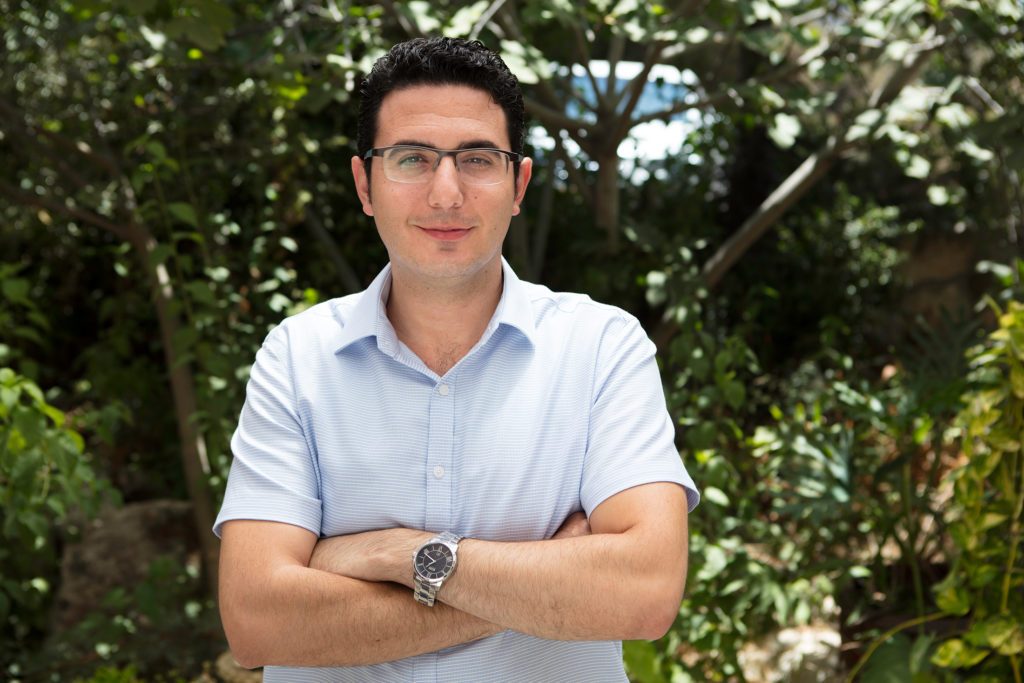Meet Our Newest Staff Member: Ameer Fakhoury
The School for Peace is excited and proud to have welcomed a new member to our staff this month- Ameer Fakhoury, who will serve as Director of the School for Peace’s Research Center.
Ameer Fakhoury is a lawyer and a doctoral student for political sociology at the University of Haifa who was born and raised in Acre. From a young age and as part of his journey to develop his identity in the “local field of identities”, Ameer found increased interest in Israeli politics. “It was during my high school years at the Arab Orthodox College in Haifa that I acquired my core values and formed my identity as a Palestinian Citizen of Israel,” says Ameer.
“After high school, I went on to study Law at the Hebrew University in Jerusalem,” Ameer says, “During that time I made a living teaching English for the psychometrics test and writing books in the same field.” Studying Law introduced Ameer to the various complicated legal and constitutional aspects relating to the Israeli-Palestinian conflict and to the status of the Palestinians in Israel. Feeling that the legal perspective is not enough to really understand the complexity of the life experience in this place, he decided to pursue a master’s degree in Peace Studies and Conflict Resolution at the International School at the University of Haifa.
Over the course of his studies, he delved deeper into the study of complex and intractable conflicts all over the world, which enriched his comparative perspective. At the same time, he began giving lectures to different groups about the legal and political aspects of the Israel-Palestinian conflict. “I remember one lecture in particular which I did in front of aviation cadets at the Nevatim Israeli Air Force Base,” Ameer says, “One hundred fifty people attended the lecture that day. And I was standing there sure that after the lecture I will be escorted out by soldiers straight into the Shin Bet’s interrogation rooms on charges of sedition. That’s not what happened in the end, obviously, but it was a formative experience in my life.”
After graduating from the master’s program with honors, and fully motivated by the encouragement he received from his professors, Ameer went on to pursue his Ph.D. in political sociology. This he sees as directly connected to his fields of interest: ethnicity and ethnic conflicts, nationality and nation states. Today he is writing his dissertation on the structuring of collective identities among Christian Arabs in Israel, as seen through the eyes of the people themselves and based on sociological and psychological theories.
Ameer was first introduced to the School for Peace by his partner, Maisa Totary, an urban planner and doctoral student in the same field, who participated in the planner’s course held jointly by the School for Peace and the Arab Center for Alternative Planning. This introduction later led Ameer to join the first of three cycles for the Politician’s course held with generous funding by the EU Peacebuilding Initiative.
“It’s hard to exaggerate the influence the experience in this course had on me,” Ameer says, “Besides internalizing that good politics are politics of alliance, I got to know people who became my partners on this path and even close friends.” Through fellow participants in this programs, Ameer was also introduced to the Two States One Homeland movement, and consequently joined them. “The way I see it, this movement offers the most just and effective solution to the Jewish-Palestinian conflict. That is why I am one of the central activists in this movement.” Recently, he traveled with colleagues from the movement to speak in front of the European Parliament on their behalf.
Since his days as a Law student, Ameer has been interested in literature dealing with the process of writing constitutions in divided societies. This interest, he reveals, is now becoming one of the flagship projects of the School for Peace’s Research Center. “I am a firm believer in the connection between knowledge creation and political agendas which have the power to improve the reality we live in,” says Ameer. “That is why, most of the projects planned for the Research Center will include people from civil society organizations, politicians, political activists, and people from the academia who care about the reality we live in.” Specifically, the Research Center plans to conduct a number of projects aimed at identifying agreements concerning the identity of the state, through dialogue with both sides; strengthening the cooperation with the democratic forces in society today; and empowering the Palestinian minority inside Israel as well as strengthening their connection with Palestinians in the West Bank and in Gaza.
“I am neither an optimist nor a pessimist. These perspectives are luxuries reserved for outside onlookers. I simply work to change things because I can and because I must.” Today Ameer lives in Haifa with his partner Maisa Totary and their two children. Besides his work at the School for Peace he also holds his private law practice based in Haifa.
In his new position, Ameer will be continuing and growing a two decade long tradition of research and work at the Center, while adding his own expertise and fresh perspective to the research. We wish Ameer great success on this new path and look forward to the upcoming projects!

